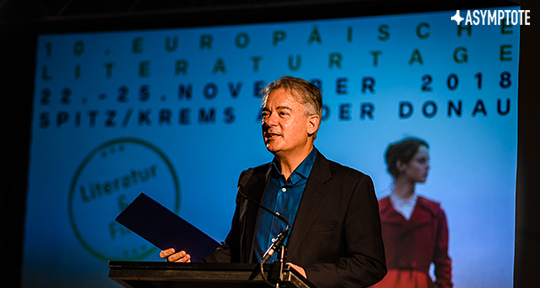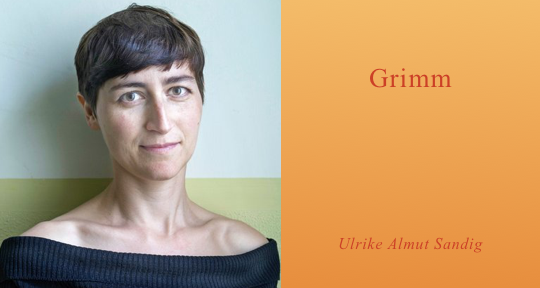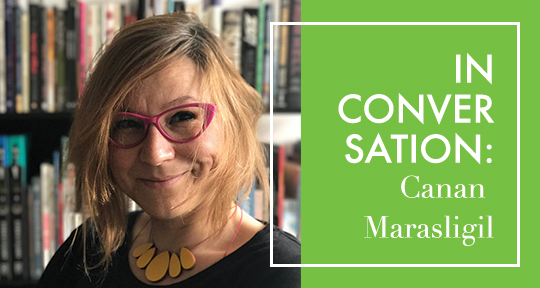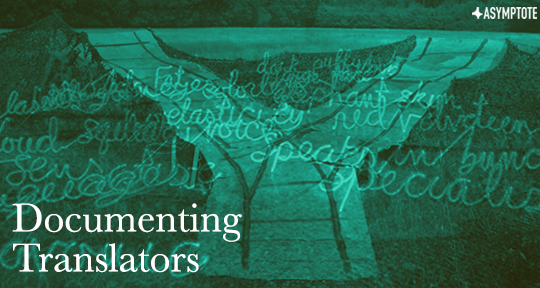Grimm by Ulrike Almut Sandig, translated from the German by Karen Leeder, Hurst Street Press
“Is someone shaking the stories”, asks the narrator in the penultimate poem from Grimm, the new collection by the German poet and performance artist Ulrike Almut Sandig, translated by the German scholar Karen Leeder and published by the Oxford-based Hurst Street Press. The collection’s slant retelling of the Grimm tales, considered integral to the German psyche, belies a significant project: to rethink the world within a time of political and economic crisis, wherein the female body is particularly precarious.
Myth, legend, and folklore provide frameworks to writers and readers across all languages and cultures within which they can understand and contextualise crises, serving also as survival strategies for everyday existence and persistence. Grimm focuses on concerns that are central, yet which are by no means exclusive, to Germany, including, the rise of the far-right, misogyny and patriarchy, and the refugee crisis. The collection’s success is that by presenting itself as a poetic cycle, and by its use of language, it suggests that all these phenomena are related. Moreover, if the Grimm tales represent the collective German imagination (indeed, according to the critic Jack Zipes, the Brothers Grimm collected their tales in order to uncover the linguistic “truths” that formed the German people), Sandig reveals its violent, misogynistic, and patriarchal dark side, connecting the tales to the fascism, patriarchy, and racism of the German present and past. If, as Leeder notes, the collection directs a “rage” at this collective consciousness and the injustices it undergirds (‘Grimm’ also means ‘rage’), this rage is inscribed within the broken language of the women to whom Sandig’s retellings give voice.
We can see this at work in the poem “Fitcher’s Bird”, taken from the tale of the same name where a young girl is kidnapped by a man who wants to marry her against her will. During her confinement, the girl discovers the mutilated bodies of her sisters who had previously disappeared from the village. She brings them back to life, escapes disguised as a bird, and then musters the village to exact vengeance on her kidnapper. In the poem, the girl is multiply alienated from herself. Not only does her confinement alienate her from her body and the outside world, so does her disguise as her friends no longer recognise her: “I am an odd/ bird, nobody/ knows me, I/ scarcely know/ myself.” Crucially, this alienation is rendered linguistically. Her imprisonment and her kidnapper’s mutilation of her sisters confine her voice in short, staccato lines, of which the protagonist is well aware: “a globe is/ stuck in my throat/ that I can’t get down […] the beautiful bodies/ of my sisters are/ piled inside.” At the poem’s end, the girl resolves to “make/ all those anew, all those/ who were butchered overnight”, intimating how Grimm in its entirety interrogates the conservative, sexist didacticism inherent in the Grimm tales by exclusively representing female characters that resist patriarchy and sexism.
The collection’s opening poem, ‘Grimm’, connects the girl’s linguistic crisis with a political crisis. Two characters write messages on eggs which smash due to the urgency of their communication, their need to express their concerns. Then, most unnervingly, they “raised [their] sticky arms/ in salute and waved in greeting. then/ lowered [their] heads to a well-nigh limitless/ supply of fragments and rage most grim.” Their rage at the status quo, their political impotence, has broken their language, their selves, and their world-view. In the poem, the girls’ rage, their inability to express their needs or have their voices democratically represented has been misdirected to support the far-right, half-concealed here in the Nazi salute. All they are left within this tragedy are the broken eggshells of their words and a right-wing anger that, thanks to Leeder’s wordplay, is ‘grim’: both evil and implicated within the German cultural consciousness synecdochically represented by the Grimm tales.
READ MORE…














